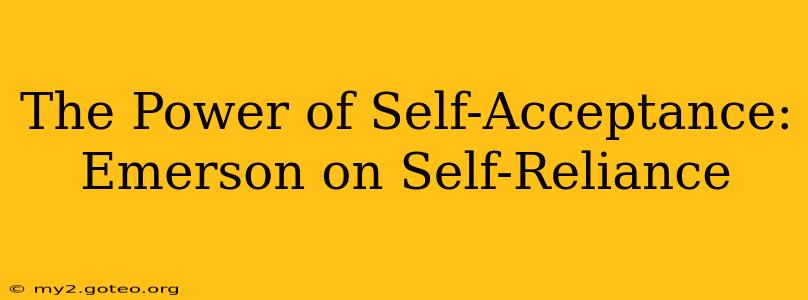Ralph Waldo Emerson's essay "Self-Reliance" remains a cornerstone of American Transcendentalism and a timeless guide to living an authentic life. While often interpreted through the lens of individualism and nonconformity, at its heart lies a powerful message of self-acceptance – a crucial step towards achieving true self-reliance. Emerson's philosophy isn't about arrogant isolation, but rather about embracing one's unique self, flaws and all, as the foundation for a fulfilling existence. This journey of self-acceptance, as Emerson envisioned, unlocks a profound sense of freedom and empowers individuals to live in accordance with their own truth.
What is Self-Reliance According to Emerson?
Emerson's concept of self-reliance transcends simple independence. It's not merely about being financially self-sufficient or avoiding societal pressures; it's a deeper commitment to trusting one's own intuition and judgment. He encourages readers to look inward, to cultivate their own inner voice, and to resist the temptation to blindly follow societal norms or the opinions of others. This inner voice, nurtured through self-acceptance, becomes the compass guiding one's actions and decisions. It's a journey of self-discovery, where the individual becomes the ultimate authority on their own life.
How Does Self-Acceptance Contribute to Self-Reliance?
Self-acceptance is the bedrock upon which Emerson's self-reliance is built. Without accepting oneself – strengths, weaknesses, and inconsistencies – it becomes impossible to trust one's own judgment and intuition. Doubt and self-criticism erode confidence, preventing individuals from forging their own path. Emerson emphasizes that true self-reliance stems from a deep understanding and acceptance of one's inherent nature. He encourages us to embrace our individuality, recognizing that our unique perspectives and experiences are valuable contributions to the world. This acceptance isn't passive resignation; it's an active process of self-knowledge and self-compassion, fueling the courage to be oneself, regardless of external validation.
What are the Obstacles to Self-Acceptance?
Emerson keenly observed the societal pressures that hinder self-acceptance. He critiques conformity, the relentless pursuit of social approval, and the stifling influence of tradition. These forces, he argues, lead individuals to suppress their authentic selves, adopting artificial personas to fit in. The fear of judgment, the desire for external validation, and the weight of societal expectations can all significantly obstruct the path to self-acceptance. Overcoming these obstacles requires courage, introspection, and a willingness to challenge conventional wisdom.
How Can We Cultivate Self-Acceptance?
Emerson doesn't explicitly lay out a step-by-step guide to self-acceptance, but his writings suggest several approaches. Firstly, introspection is crucial. Spending time in quiet reflection, honestly assessing one's strengths and weaknesses, and acknowledging both positive and negative aspects of oneself is paramount. Secondly, embracing individuality is essential. This means celebrating one's unique talents, passions, and perspectives, rather than striving to conform to a predetermined ideal. Thirdly, cultivating self-compassion is key. Acknowledging imperfections and practicing self-forgiveness are vital steps in the journey to self-acceptance. Finally, trusting one's intuition is paramount; this inner voice, once nurtured through self-acceptance, will guide individuals towards authentic choices and a fulfilling life.
Isn't Self-Reliance Just Egotism?
This is a common misconception. Emerson's self-reliance is not about egotism or self-centeredness. It's about recognizing the inherent worth of each individual and the importance of living authentically. By accepting oneself fully, individuals are better equipped to contribute meaningfully to society. True self-reliance often fosters empathy and understanding, as it stems from a place of self-awareness and self-acceptance, not arrogance.
How Does Emerson's Philosophy Relate to Modern Life?
Emerson's message of self-reliance and self-acceptance resonates profoundly in today's world, where societal pressures and the relentless pursuit of external validation can be overwhelming. His philosophy offers a powerful antidote to the anxieties of modern life, encouraging individuals to prioritize authenticity and inner peace over external validation. In a culture often obsessed with conformity, Emerson's call to embrace individuality and trust one's own intuition remains as relevant and inspiring as ever. By understanding and practicing self-acceptance, individuals can unlock their full potential and live lives of purpose and meaning.

